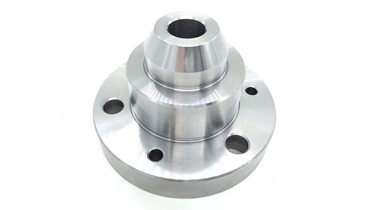This website uses cookies so that we can provide you with the best user experience possible. Cookie information is stored in your browser and performs functions such as recognising you when you return to our website and helping our team to understand which sections of the website you find most interesting and useful.
- Home
- Materials
- CNC Machining Metal
- Aluminum
- Aluminum 7075
Aluminum 7075

Material Type
Metal
Material Name
Aluminum 7075
Alternative Names
AlZn5.5MgCu | AA7075 | A97075 | AlZnMgCu1,5 | 3.4365
Process Compatibility
CNC Milling, CNC Turning
introduction
Aluminum 7075 in CNC Machining

Aluminum 7075 is a strong and lightweight alloy often chosen because of its high strength-to-weight ratio. It is used in CNC machining, but it comes with challenges.
Carbide tools, known for their hardness, are commonly used while optimizing cutting speeds and feeds is important to balance material removal rates and tool life. The alloy's strength necessitates rigid setups to minimize vibrations during machining. Adequate cooling using appropriate coolant is also important to dissipate the heat generated. Lubrication helps reduce friction and enhance tool life. The mechanical properties of 7075 aluminum alloy vary with tempering. 7075-O is corrosion-resistant with a max tensile strength of 280 MPa. T6 heat treatment increases strength to 540 MPa. T7 resists stress corrosion. RRA involves multistage heat treatment, restoring strength to T6 levels.
Belonging to the 7000 series, this alloy is extensively used in marine, automotive, and aviation transportation. Its applications range from rock climbing gear, bicycle components, inline skating frames to hobby-grade RC models and ,hang glider airframes. Moreover, the 7075 alloy is also used for lacrosse sticks, camping utensils, competition yo-yos, and drag racing engine connecting rods. While aluminum rods in drag racing engines may have a shorter fatigue life than forged steel rods, they offer reduced mass, minimizing mechanical stress during high-speed, full-throttle operations.
Properties
Properties Table of Aluminum 7075
| MECHANICAL PROPERTIES | |
|---|---|
| Ultimate Tensile Strength | ~570 MPa |
| Yield Strength | ~500 MPa |
| Young's Modulus(Elasticity) | 71 GPa |
| Elongation at Break | 11 % |
| Physical properties | |
| Corrosion Resistance | Good |
| Magnetism | Non-magnetic |
| Weldability | Fair(with certain precautions) |
| Thermal properties | |
| Maximum Service Temperature | ~120 °C(for continuous use) |
| Thermal Expansion Coefficent | 23,2 x 10^-6/ºC |
| Thermal Conductivity | 130 W/(m⋅K) |
| Electrical properties | |
| Electrical Resistivity | 0.000032 ohm-cm |
| ESD Safety | Generally ESD safe |
TECHNOLOGY OVERVIEW
Basic Knowledge of Aluminum 7075
What is Aluminum 7075?
7075 aluminum alloy, or AA7075, was initially developed secretly by Sumitomo Metal in 1935. The alloy was reverse engineered by Alcoa in 1943 after examining a captured Japanese aircraft. It was standardized for aerospace use in 1945. 7075 became a key material for airframe production in the Imperial Japanese Navy.
It is a strong and durable material used in structural applications, especially in aircraft components. Its main alloying element is zinc. It has good mechanical properties like fatigue resistance, ductility, toughness, and high strength. Despite being prone to embrittlement due to microsegregation, it surpasses the corrosion resistance of alloys in the 2000 series.
The alloy typically contains 5.6–6.1% zinc, 2.1–2.5% magnesium, 1.2–1.6% copper, and trace amounts of silicon, iron, manganese, titanium, chromium, and other metals. It has various tempers, such as 7075-0, 7075-T6, and 7075-T651, which offer different characteristics.
Advantages of Aluminum 7075
- High Strength
- Good ductility and toughness
- Lightweight
- Corrosion Resistance (comparable to other aluminum alloys)
- Fatigue Resistance
- Versatility in Tempers
- Weldability and Machinability
- Proven Aerospace Use
- Developed for High-Stress Applications
- Historical Significance (World War II and aerospace standardization)
Applications of Aluminum 7075
- Aircraft wings and fuselage components
- Automotive chassis parts
- Bicycle frames
- Military armored vehicle components
- Climbing carabiners
- Marine applications requiring corrosion resistance
- High-strength tools and equipment
- Machinery components
- Motorsports racing car and motorcycle parts
- Certain consumer electronics components
FAQ
Machining Aluminum 7075 Buying FAQ
Other Materials

Aluminum 6082
Aluminum 6082 is known for being highly resistant to corrosion and possessing exceptional strength.It is a popular choice for applications under stress.

Aluminum 6061
Aluminum 6061 (CNC) is the most popular aluminum alloy. It has good strength-to-weight ratio, excellent machinability and natural corrosion resistance.

Aluminum 5083
Aluminum 5083 is a corrosion-resistant, high-strength, non-heat-treatable alloy commonly used in CNC machining.
Get An Accurate Quote For Your Next Projects
No matter your project is complicated or simple, no matter is metal or plastic, you will get an accurate quotation within 6 hours.
Get A Quote Today